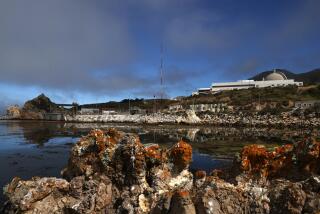Tritium Reactor May Stay Shut Till End of 1989
- Share via
WASHINGTON — The growing concerns about safety at the Department of Energy’s Savannah River nuclear weapons plant will almost certainly require delaying the restart of the first of the facility’s three shut-down tritium-producing reactors beyond next summer, a congressman and other Capitol Hill sources said Monday.
The 35-year-old Savannah River plant, which has been closed for safety reasons since June, is the nation’s only source of perishable tritium, a key component of nuclear weapons that must be replaced periodically.
The safety problems have led to a schedule of improvements so extensive that the earliest possible date for restarting the plant’s K-reactor is now “something toward the end of the year,” said Rep. John M. Spratt Jr. (D-S. C.), who was given a tour of the facility last week.
Tritium Shortage Seen
Such a postponement of the restart at the plant in Aiken, S. C., would exceed by months a guideline set for national security reasons by Pentagon and Department of Energy officials. Those officials had warned that the nation would face a tritium shortage if production was not resumed quickly.
The Pentagon and Energy Department weapons officials had previously suggested that, without new production by mid-1989, nuclear weapons would have to be recharged with tritium from existing weapons in order to maintain the nation’s nuclear deterrent.
Given the likelihood that the restart will be delayed substantially, Spratt said: “I think it would be prudent for the Department of Defense to begin planning for an outage.”
To date, Energy Department officials have expressed confidence that the Savannah River K-reactor would be back on line by summer at the latest, thus preventing a tritium crisis.
In extensive briefings at Savannah River, members of the Energy Department team there have now made clear that the time required for safety checks and improvements would virtually preclude getting the K-reactor restarted again before autumn, according to the congressional sources.
“We’re in a situation now where so much is going to have to be fixed that we’re not going to see restart for at least a year,” one source said.
Prospects for a prompt restart were further dampened over the weekend, Spratt and several congressional aides said, by disclosures that new cracks had been found in pipes leading to two Savannah River reactors, including one leading to the K-reactor.
New Cracks Discounted
Energy Department officials on Monday dismissed the disclosures of cracks in the K-reactor pipeline as “not a new or serious safety concern” and said replacement of the pipe would not delay the restart scheduled for the summer.
But congressional sources noted that Energy Department officials had hoped previously to restart the K-reactor before completing ultrasonic tests that could help find further cracks.
In the wake of the new discoveries, they said, a top Energy Department official informed congressional aides Monday that the department had decided to complete the time-consuming testing procedure before restarting the reactor.
Citing classified analyses, some Pentagon officials have suggested generally that, unless production is resumed on time, the composition of the nation’s nuclear stockpile may have to be altered significantly as some weapons are dismantled in order to supply tritium to others.
Their allies on Capitol Hill sound similar warnings. “Unless we resume production by mid-summer,” one House Republican aide said, “that is when we will begin to feel that effect on the nuclear stockpile.”
But that aide conceded: “It’s not Chicken Little. The world doesn’t come to an end.”
Elsewhere in Congress, increasing skepticism has emerged among members frustrated by the Energy Department’s performance and mistrustful of what one Senate aide called the “production at any cost” mentality.
“For decades, the (Energy Department) has basically said to the American people: ‘Trust us, we know best,’ ” Rep. Ron Wyden (D-Ore.) said. “Because of the events of the last few months, that position will no longer be accepted. That’s been the watershed.”
Could Retire Weapons
Those members contend that the nation’s tritium supply is likely to last beyond mid-summer. If a shortage emerged in the longer term, they say, it could easily be remedied through the accelerated retirement of low-priority weapons like the older Poseidon submarine-launched ballistic missiles.
Another proposed strategy for coping with a shortage would be to recharge weapons with tritium to last only for two or three years, rather than the usual four or five years. This would roughly double the existing supply.
“We want to be satisfied that (the Savannah shutdown) doesn’t leave the Pentagon completely without alternatives,” said Spratt, who favors a cautious approach to restarting the aging reactors. “But my feeling is that there are things they can do in the short term without adversely affecting our nuclear arsenal.”
Staff writer Robert Gillette contributed to this story.
More to Read
Sign up for Essential California
The most important California stories and recommendations in your inbox every morning.
You may occasionally receive promotional content from the Los Angeles Times.













